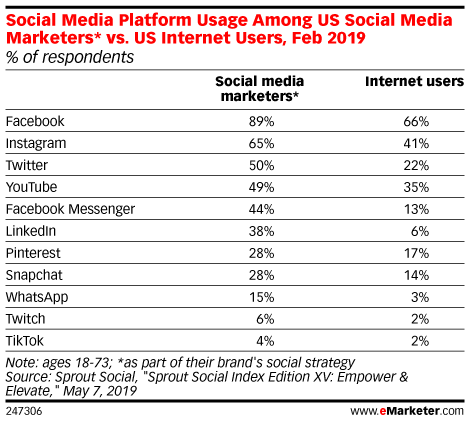My my, it’s the middle of August already! The year is speeding by, and it can be tough for content marketers to keep pace with all the goings-on.
But have no fear, Content Marketing Weekly is here to catch you up on all the industry news that’s fit to print.
Is TikTok the New Launching Pad for Video Creators?
Let us first start this blurb off by paying respects to the best social media platform in history: R.I.P. Vine.
You might recognize the TikTok logo but did you know the bite-sized video platform that took up Vine’s torch, has gone berserk on growth recently. The China-based app was already mega popular on the mainland and throughout Asia, but now boasts throngs of adoring fans and creators stateside.
Most likely you have stumble across traditional TikTok videos: Teens bopping along to songs and lip-syncing lyrics. But now content creators are branching out into different styles, much like how Vine was used, to post comedy bits, fan interactions or cats — always cats.
Yet while only 4% of social media marketers and 2% of U.S. internet users are on TikTok, many are seeing it as a serious contender to YouTube’s throne, whose share of the digital video-watching audience has stagnated.

“YouTube has been a home for video creators for more than a decade,” said Debra Aho Williamson, principal analyst at eMarketer. “But it’s starting to see real competition from TikTok as well as other social platforms like Facebook, Snapchat and Instagram. All of them want a piece of the massive audience for creator content that YouTube has built.”
It may take some time, however. In addition to low usage rates, TikTok doesn’t have built-out ad services on par with YouTube that allow monetization. Until there is, some brands are partnering with TikTok stars in influencer campaigns.
To read more, check out eMarketer’s blog “Is TikTok the New Launching Pad for Video Creators?”

Why White Hat SEO is No Longer a Thing
White hat SEO and black hat SEO tend to go at each other like their monochromatic counterparts of comic strip “Spy vs. Spy.” However, as Search Engine Journal contributor Roger Montti explains it, there might not be as great a difference between the two as imagined.
Montti contends the lines have become more blurred than ever in his post “Why White Hat SEO is No Longer a Thing.” In it he goes through various misconceptions and closely held beliefs about black hat SEO that may change how you and other digital marketers look at things.

In his seven reasons for believing white hat SEO is a thing of the past, Montti goes on to root out myths like back hat can’t generate value or that they are hackers or criminals: Google’s guidelines are, after all, neither law nor moral or ethical code.
“I don’t practice black hat SEO,” Montti writes,”But I’ve been in the SEO industry for almost 20 years and I know many white hats who secretly use black hat practices … The culture of finger pointing as a marketing practice is hypocritical. The black hat/white hat dichotomy is false.
White hat SEO is a concept created for promotional purposes. A better description is SEO that conforms to Google’s guidelines.”
To read more about Montti’s take, check out “Why White Hat SEO is No Longer a Thing” at Search Engine Journal.
52% Customers Find Web Content Too Long and Boring, Reports Blue Fountain Media
This headline pretty much speaks for itself: Half of digital consumers aren’t engaging with the content they consume.
As explained by MarTechAdvisor, the research done by Blue Fountain Media found video, captioned pictures and podcasts were gaining on traditional content forms like text. YouTube and Facebook were favored platforms for video, but 52% said their biggest problem with content today is that it is too commercial or boring and basic (cited by 48%).
“Content may still be king, but the ways consumers prefer to receive that content is ever-changing” said Elizabeth Minton, Head of Corporate Marketing at Blue Fountain Media.
“75% of our survey respondents told us video and pictures are what move them to action as opposed to blogs and emails. Though, increasingly, in an era of fake news, they are also concerned about the authenticity of the content they are exposed to.”
Such an experience with bad content is a big risk. Nearly one-third of respondents said interacting with bad content would cause them to question the product or service.
Read more survey results from “52% Customers Find Web Content Too Long and Boring, Reports Blue Fountain Media” here.
Come back next time for more insights from Brafton’s Content Marketing Weekly! Or get in touch with us today to learn more about video or other content services.




